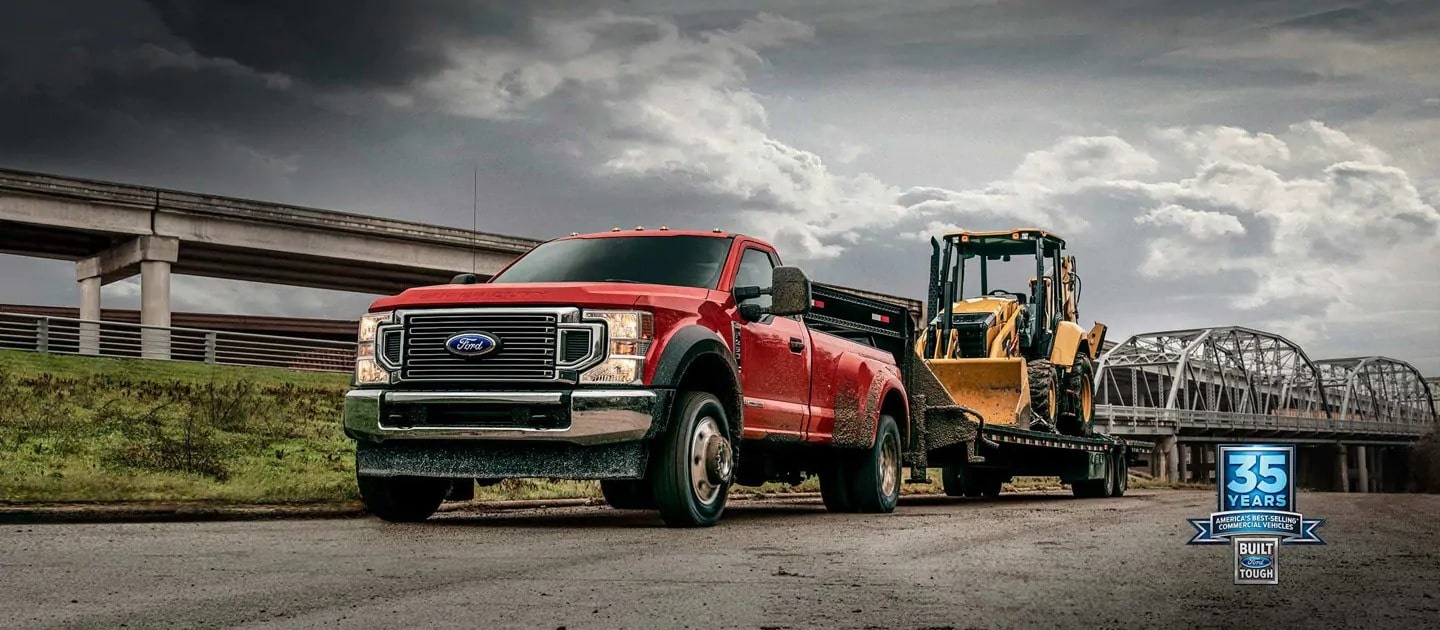Ford Towing Guides

Common Towing Definitions
GCVW – Gross Combined Vehicle Weight (GCVW) is the total combined weight of a fully loaded vehicle, including passengers, payload and everything in tow.
GVW – Gross Vehicle Weight (GVW) is the total weight of a fully loaded vehicle, including passengers and payload – but excluding all towing.
GTW – Gross Trailer Weight (GTW) is the total weight of the trailer plus all the cargo in it.
CURB WEIGHT – The weight of a vehicle without any passengers or cargo, but including all necessary fuel, fluids and standard equipment.
TRAILER TONGUE WEIGHT – The downward force exerted on the hitch ball by the trailer coupler. In most cases, it should fall between 10 to 25 percent of
GTW.Trailer tongue weight must be accounted for in total payload.
REAR AXLE RATIO – The ratio between the revolutions per minute of the driveshaft and the rear axle. In general, a higher number offers more towing power; a
lower number offers better engine efficiency. How does axle ratio affect my towing and payload capability? (Applicable to pickups and Chassis Cabs only.)
In general, a higher axle ratio offers more towing power and quicker acceleration, while a lower axle ratio offers better engine efficiency and quieter running.
The axle ratio describes the relationship between the driveshaft revolutions per minute and the rear axle”s revolutions per minute. For example, an axle ratio of
4.1:1 means the small pinion gear at the end of the driveshaft must rotate 4.1 times for every single rotation of the rear axle. Finding your ideal axle ratio will be a compromise. You want a ratio that will give you good towing power without handicapping your non-towing performance too severely. By determining how much weight you”ll be towing and how often you”ll be towing it, you”ll be able to find a ratio that will maximize both power and engine efficiency.
Common Towing Weights (1)
TRAILERS
Boat trailer: 300 – 1,512 pounds
6 x 12 steel utility trailer: 1700 pounds
6 x 12 aluminum utility trailer: 650 pounds
Car trailer: 1400 – 2,800 pounds
8.5 x 18 enclosed equipment trailer: 2,700 pounds
6 x 12 enclosed equipment trailer: 1,700 pounds
Dump trailer: 2,000 to 4,000 pounds
RECREATIONAL TRAILERS
Boat trailer: 300 – 1,512 pounds
Fifth-wheel trailers: 19,000 pounds (3,126 pounds trailer tongue weight)
Travel trailer: 5,000 – 12,000 pounds
Camping trailer: 3,000 pounds
Truck camper: 3,500 pounds (unloaded)
BUILDING MATERIALS
Plywood: 3 pounds / square foot per inch of thickness
Gravel: 3,400 pounds / yard
Cement mix: 80 pounds / bag
Mulch: 500 pounds / yard
Sand: 2,600 pounds / yard
Pavers: 3,170 pounds / pallet (624 pavers)
UPFITS
Rollback: 1,500 pounds
Stake bed: 1,500 pounds
Cherry picker: 2,000 – 5,000 pounds
BOATS
Canoe / kayak: 50 pounds
Motorboat: 2,500 pounds
Sailboat: 7,000 pounds
VEHICLES
Racecar: 1,600 – 3,500 pounds
Sedan: 3,000 pounds
Station wagon: 3,600 pounds
Pickup truck: 5,500 pounds
CONSTRUCTION EQUIPMENT
Backhoe: 14,000 – 19,000 pounds
Bulldozer: 16,000 – 19,000 pounds
Cement mixer (6 cubic feet): 670 pounds
Cement mixer (1 cubic yard): 7,000 pounds
Commercial Wood Chipper 3,000 – 6,000 pounds
Generator (3100 watt): 181 pounds
Generator (6500 watt): 209 pounds
Generator (9000 watt): 225 pounds
Skid Steer: 4,500 – 8,000 pounds
Stump grinder: 1,450 pounds
AGRICULTURAL
Personal Use Tractors: 1,300 – 4,000 pounds
General Use Tractors: 4,000 – 10,000 pounds
Commercial Use Tractors: 10,000+
Notes: (1) Estimates only, actual towing weights will differ. It is important to determine the actual Gross Trailer Weight of the trailer, which includes all cargo in it.
Copyright © 2022 Bob Moore. All rights reserved.